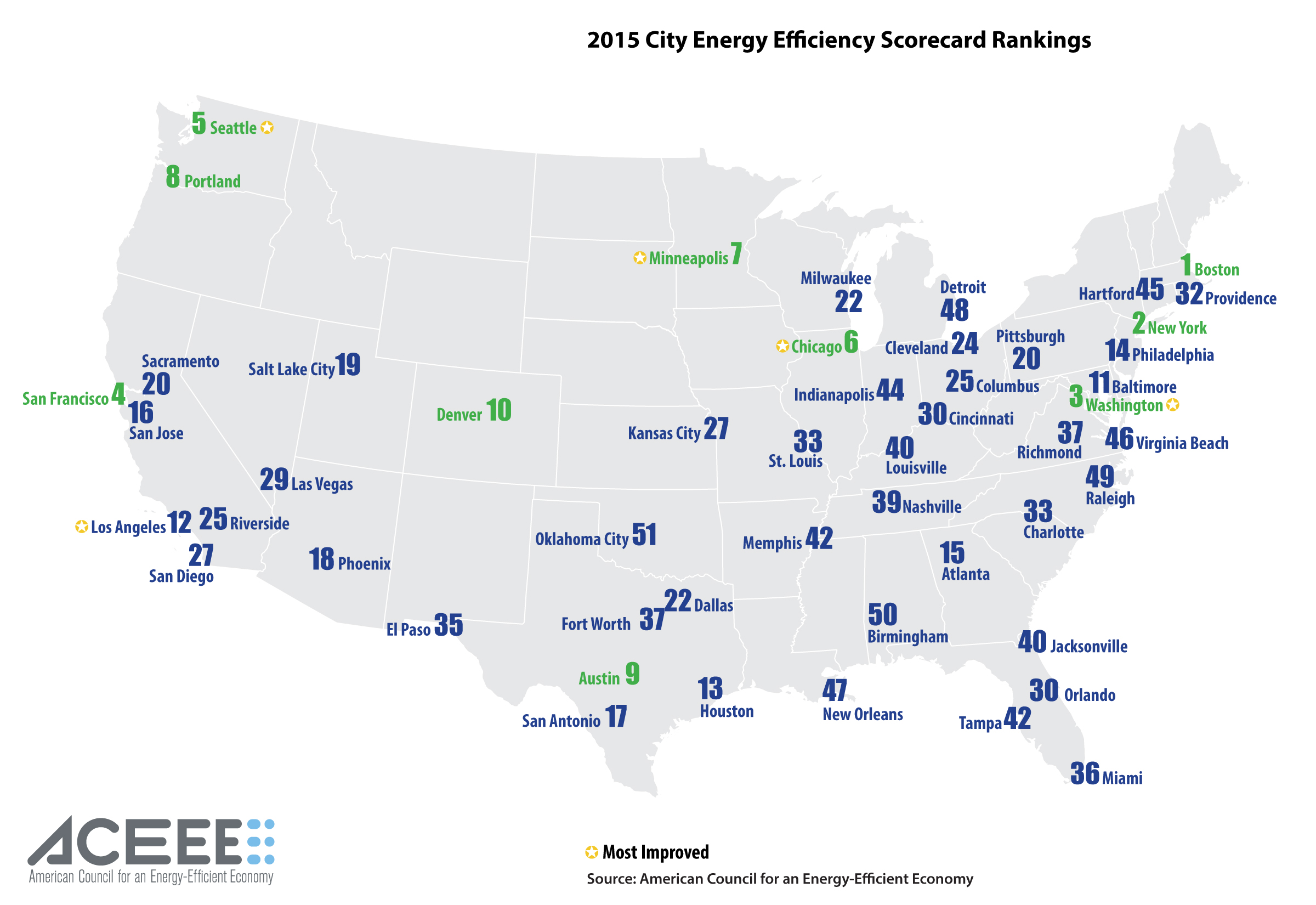
By Cyrus Reed
In a national report released this week, the American Council for an Energy-Efficient Economy (ACEEE) ranked the top 51 cities in the United States for policies and programs designed to save energy – including in some cases water and gas. Five Texas cities made the list. While no Texas cities scored in the top five, several – including Austin and Houston – were near the top of the list.
San Antonio and Dallas also faired well, coming in 17th and 22nd place, while Fort Worth and El Paso were further down the list.
The 2015 City Energy Efficiency Scorecard ranked cities according to five large categories:
- local government operations
- community-wide initiatives
- buildings policies
- energy utilities
- water utilities.
Topping the list nationally were Boston, New York City, Washington, San Francisco, and Seattle.

Austin came in in 9th place, largely on the basis of its forward-thinking building policies, energy and water utility programs, and local government operations. Houston also faired well on building policies and local government operations. San Antonio did relatively well because of their energy and water utility policies – led by CPS Energy and the San Antonio Water Systems – but had relatively lower scores on building policy and local government operations. The 2015 report only reports on existing policies, so San Antonio was given no credit for their recent decision to move to the 2015 IECC code in January, becoming the first city in Texas to adopt this more efficient code. Still, the relatively good scores for Austin, Houston, San Antonio, and Dallas point to the positive role local city councils – and in some cases local utilities – can play in driving more energy efficient cities.
It also points to how much more can be done. While San Antonio did pass the 2015 IECC for new building construction, and has set local energy and water savings goals, they do relatively poorly as a city on complying with codes, benchmarking or transparency. Cities like Austin and Houston, while generally doing better on issues like compliance, benchmarking, and transparency, will begin looking at the 2015 IECC – and local amendments – this year. Dallas is still operating on the 2009 building code when it comes to energy and also has low compliance scores. Clearly, much more can be done in Texas on many issues to make our cities more energy efficient.
Table. How Texas Cities Scored on ACEEE’s Scorecard
Rank | City | Local Govt Operations 15 Pts. | Community-Wide Initiatives 10 Pts. | Building Policy 29 Pts. | Energy & Water Utilities 18 Pts. | Transportation 28 Pts. | Total |
9 | Austin | 10.5 | 8 | 21.5 | 10 | 12.5 | 62.5 |
13 | Houston | 10 | 3.5 | 12 | 10 | 15.5 | 51 |
17 | San Antonio | 8 | 6.5 | 7.5 | 9.5 | 13.5 | 45 |
22 | Dallas | 8.5 | 2.5 | 8.5 | 8 | 12.5 | 40 |
35 | El Paso | 7.5 | 0.5 | 3.5 | 8 | 10 | 29.5 |
37 | Fort Worth | 7 | 2.5 | 3.5 | 8.5 | 6.5 | 28 |
Source: Table ES1, ACEEE, The 2015 City Energy Efficient Scorecard
The state, however, may have just given a jumpstart to Texas cities. Just this week, the Senate took up and approved HB 1736, a compromise building energy codes bill that would make the energy chapter of the 2015 International Residential Code – equivalent to the 2015 IECC – the state code on September 1, 2016, for all new homes. While the bill allows a flexible “Energy Rating Index” compliance path – commonly known as the HERS, or Home Energy Rating - the bill also allows local cities to adopt a more efficient HERS rating. Thus, as an example, while the bill would require all cities in Texas to adopt the 2015 energy codes, a local city could either decide to adopt the HERS score in the bill – it would be 65 in Austin – as a minimum, or a city could decide to go with a more efficient score such as 59 or even 51, which is the score recommended in the 2015 IECC. Thus, while cities must adopt the 2015 code for new homes by September 2016 under the bill, they can choose to adopt a more efficient compliance path. The bill is expected to go to the Governor’s Office soon.
SECO (State Energy Conservation Office) is also expected to take up the discussion of the 2015 IECC for commercial and industrial buildings this summer, meaning it could likely be that Texas begins to require cities to update their residential and commercial codes.
With the September 2016 deadline coming up, now is the time for these cities to begin the code update process. Sierra Club expects to be involved, along with our many members, hoping for more energy efficient cities.